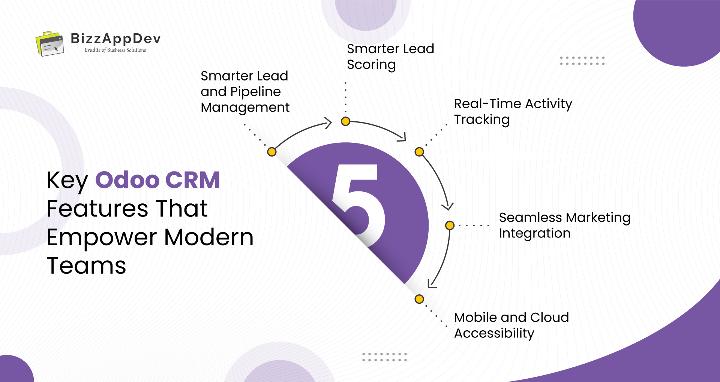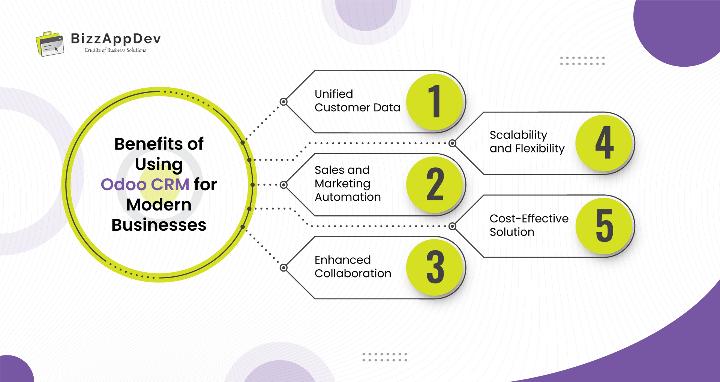In today’s business world, where customer expectations evolve faster than ever, building meaningful relationships has become both an art and a science. Organizations no longer rely on spreadsheets or outdated databases – they need agile, intelligent systems that align marketing, sales, and service teams toward a unified goal: delivering exceptional customer experiences.
That’s where Odoo CRM steps in. As part of Odoo’s powerful business suite, it enables companies to manage leads, track opportunities, and strengthen relationships – all within a single, customizable platform. With the release of Odoo 19, the CRM module delivers smarter lead-scoring automation, improved dashboard analytics, and tighter native integrations such as WhatsApp messaging.
Understanding the Role of Odoo CRM in Today’s Business Landscape
The business landscape has shifted dramatically over the past decade. Customers interact with brands across multiple channels – social media, websites, email, and in-person. Managing these touchpoints manually is no longer feasible.
The role of Odoo CRM is to centralize these interactions and turn scattered data into actionable insights. It gives businesses a 360° view of each customer, allowing teams to anticipate needs, personalize communications, and close deals faster.
Unlike traditional CRMs that often feel rigid or overly complex, the Odoo CRM system combines flexibility with user-friendly design. Sales teams can visualize their pipelines, track communications, and schedule follow-ups effortlessly. It’s not just a software tool; it’s a strategic ally for businesses adapting to digital-first realities.
What truly makes Odoo CRM stand out is its adaptability. Whether you’re running a startup or managing an established enterprise, the platform scales with your needs, offering features like custom fields, automated workflows, and advanced reporting without the heavy licensing costs typical of other CRM vendors.

Key Odoo CRM Features That Empower Modern Teams
Modern businesses run on data, speed, and collaboration and Odoo CRM provides all three. Its latest version introduces a host of enhancements designed to help organizations stay connected and agile.
1. Smarter Lead and Pipeline Management
Odoo CRM’s visual Kanban pipeline gives sales teams full visibility of every opportunity, from first contact to final conversion. The drag-and-drop interface makes it easy to update lead status, assign tasks, and prioritize prospects.
For a deeper breakdown of how Odoo CRM streamlines the lead journey end-to-end, check out this detailed guide:
How Odoo CRM Simplifies Lead Management for Sales Teams
2. Smarter Lead Scoring
Enhanced algorithms in Odoo 19 rank leads by engagement history, source quality, and probability to convert. This ensures that sales representatives focus on the most promising opportunities.
3. Real-Time Activity Tracking
No more missed calls or forgotten follow-ups. The CRM keeps a detailed log of every activity meeting, emails, and calls in one place. Sales managers can monitor team performance in real time and identify bottlenecks instantly.
4. Seamless Marketing Integration
Odoo CRM links with Email Marketing, Social Marketing, and Marketing Automation modules, featuring an improved flow-builder interface for smoother campaign management.
5. Mobile and Cloud Accessibility
Whether your team is on the road or working remotely, the mobile app ensures constant access to key insights. Cloud synchronization keeps everyone aligned, promoting consistent and responsive customer communication.
The latest version also introduces built-in WhatsApp connectivity, allowing teams to message leads and log conversations directly inside CRM.
These Odoo CRM features are designed to reduce manual work, enhance collaboration, and improve decision-making key components of modern CRM software for digital-first businesses.

Benefits of Using Odoo CRM for Modern Businesses
Businesses today aren’t just selling products, they’re selling experiences. And those experiences depend on timely communication, accurate data, and informed decisions. Here are some compelling benefits of using Odoo CRM for organizations striving to excel in a competitive market:
- Unified Customer Data – Consolidate information from sales, marketing, and service into a single view for better decision-making.
- Sales and Marketing Automation – Eliminate repetitive tasks with intelligent automation that frees up time for high-value interactions.
- Enhanced Collaboration – Integrated with Odoo ERP, CRM users can easily access inventory, invoicing, and project data, ensuring every department works in sync.
- Scalability and Flexibility – The open-source nature of Odoo allows customization to match any business process.
- Cost-Effective Solution – Compared to other premium CRMs, Odoo provides enterprise-grade capabilities at a fraction of the cost.
For organizations handling customer data across regions, Odoo CRM also includes GDPR-friendly tools such as consent tracking and contact anonymization ensuring compliance and trust.
These benefits aren’t theoretical businesses across industries are already witnessing real transformation through Odoo CRM automation, streamlining workflows and achieving better visibility into sales performance.
Odoo CRM vs Traditional CRM Systems
While many CRMs claim to simplify customer management, few offer the flexibility and integration depth of Odoo. Let’s briefly compare:
Feature | Traditional CRM | Odoo CRM |
Licensing | Proprietary, often expensive | Open-source, affordable |
Customization | Limited | Highly adaptable |
Integration | Requires external tools | Built-in integration with ERP, accounting, and marketing |
Automation | Basic or add-on | Fully integrated |
Scalability | Restricted by cost | Scales easily with modules |
Traditional systems often lock businesses into rigid structures, but Odoo CRM encourages adaptability ideal for digital-first companies that evolve rapidly and want the freedom of open-source scalability. Its modular architecture allows seamless extensions through Odoo implementation projects, ensuring businesses only pay for what they need.
How to Use Odoo CRM to Boost Sales and Customer Relationships
Harnessing Odoo CRM effectively goes beyond just installing the system. It’s about optimizing its features to align with your sales process.
Here are some practical ways to get started:
- Automate repetitive tasks such as lead assignments, follow-ups, and reminders.
- Integrate email and chat to maintain consistent customer communication.
- Use dashboards and reports to analyze conversion rates and forecast trends.
- Leverage AI insights for smarter prioritization and customer segmentation.
Managers can now create personalized dashboards directly from CRM using pivot and graph views for faster decision-making.
With these strategies, teams can close deals faster and deliver more personalized customer experiences. The result? Stronger trust, better conversions, and higher lifetime value, all driven by business process automation with Odoo.
Advantages of Integrating Odoo CRM with ERP
A true game-changer lies in connecting your CRM with the rest of your operations. Odoo ERP integration with CRM creates a seamless flow of data across departments.
For example, when a salesperson creates a quotation, the system can instantly check product availability, generate an invoice, or trigger production, all without switching platforms. This automation reduces manual hand-offs, minimizes errors, and enhances customer satisfaction.
The advantages of integrating Odoo CRM with ERP are undeniable: unified data management, faster decision-making, and improved profitability. This holistic approach ensures that every team from marketing to logistics shares the same version of truth.
Real-World Odoo CRM Success Stories
Many businesses have achieved impressive outcomes after implementing Odoo CRM. From startups to established enterprises, the results speak for themselves:
- Improved Lead Conversion: Companies have reported up to a 30% increase in conversion rates thanks to intelligent lead scoring and better sales visibility.
- Faster Response Times: Integrated communication tools ensure customers receive timely replies, improving satisfaction scores.
- Enhanced Collaboration: Sales, finance, and service teams work cohesively under one platform, reducing miscommunication and duplicated effort.
These Odoo CRM customer success stories demonstrate how flexible configuration and continuous updates make Odoo a future-ready solution for organizations committed to digital transformation.
The Future of Odoo CRM in Digital-First Customer Management
The CRM landscape is evolving toward predictive analytics, AI-driven personalization, and omnichannel engagement. Odoo CRM is already adapting to this shift.
With recent updates in Odoo ERP, users gain access to enhanced forecasting insights through improved lead-scoring logic and a refreshed marketing-automation flow builder. This forward-looking design ensures that Odoo remains at the forefront of customer relationship management tools for years to come.
For businesses embracing digital transformation, Odoo CRM isn’t just a platform; it’s a growth enabler. It helps teams work smarter, connect deeper, and sell better in an increasingly competitive environment.
FAQs about Odoo CRM
1. What is the role of Odoo CRM in customer management?
Odoo CRM centralizes customer data, tracks sales pipelines, and automates workflows, helping businesses build lasting customer relationships.
2. How does Odoo CRM help businesses build better relationships?
By combining automation, real-time insights, and integration, Odoo ensures that every interaction is timely, relevant, and personalized.
3. What are the top Odoo CRM features in the latest version?
Enhanced lead-scoring logic, smart activity tracking, and unified marketing-automation flows are among the latest Odoo CRM features introduced.
4. Is Odoo CRM suitable for small businesses?
Yes, its modular design makes it perfect for startups and SMEs, allowing them to scale without heavy upfront investment.
5. How is Odoo CRM different from traditional CRMs?
Unlike traditional systems, Odoo CRM is open-source, customizable, and fully integrated with ERP and other business applications.
Conclusion – Transform Your Customer Relationships with Odoo CRM
The future of customer relationship management is agile, data-driven, and integrated and Odoo CRM embodies all three. Whether you’re modernizing your sales process, improving customer engagement, or aligning departments through automation, Odoo provides the flexibility and intelligence needed to thrive.
Through strategic Odoo customization and smart Odoo integration, businesses can tailor the CRM to match their exact workflows ensuring that every customer touchpoint adds value. Combined with apps like Helpdesk and Project, Odoo CRM supports a complete customer lifecycle from lead to post-sale service.
If you’re ready to reimagine how your business connects with customers, it’s time to explore the possibilities of Odoo CRM a modern solution for a connected, customer-first world.
Ready to modernize your customer relationships?
Experience how Odoo CRM simplifies your sales, marketing, and service operations through automation and integration.